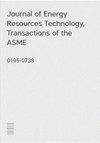Numerical Investigation on Thermal Performance in Low-enthalpy Geothermal System under the Impact of Anisotropic Reservoir Heterogeneity and Well Layout
IF 2.4
3区 工程技术
Q3 ENERGY & FUELS
Journal of Energy Resources Technology-transactions of The Asme
Pub Date : 2023-10-18
DOI:10.1115/1.4063839
引用次数: 0
Abstract
Abstract The utilization of low-enthalpy geothermal systems holds substantial potential for mitigating the greenhouse effect. However, the thermal efficiency of geothermal systems is significantly influenced by the spatial distribution of reservoir property, particularly permeability and porosity. In this work, we systematically investigate the impact of anisotropic heterogeneity in porosity and permeability on geothermal performance using numerical method. The thermal performance is evaluated based on parameters such as thermal production lifetime, thermal breakthrough time, and thermal production energy. Our findings indicate that with an increase in correlation length from 100 to 500m, highly heterogeneous reservoirs tend to regionalize pores, forming highly conductive fluid flow channels. This led to shorter thermal production lifetime and thermal breakthrough time. Moreover, the thermal performance varied significantly with different rotation angles in a double well layout, displaying a maximum difference of 41.17% compared to homogeneous reservoir. This difference decreased with the number of wells, reaching 32.82% and 16.66% in triple and quadruple well layouts, respectively. Consequently, the thermal performance was more stable under uncertain well positions in the quadruple well layout, but with reduced heat extraction efficiency. Our research results provide valuable insights into the impact of anisotropic heterogeneity on thermal performance in low-enthalpy geothermal systems.各向异性储层非均质性和井布影响下低焓地热系统热性能数值研究
摘要利用低焓地热系统对缓解温室效应具有巨大的潜力。然而,地热系统的热效率受储层物性,特别是渗透率和孔隙度的空间分布的显著影响。本文采用数值方法系统研究了孔隙度和渗透率各向异性非均质性对地热性能的影响。热性能是根据热生产寿命、热突破时间和热生产能量等参数来评估的。研究结果表明,随着对比长度从100到500m的增加,高非均质储层孔隙趋于区域化,形成高导电性流体流动通道。这缩短了产热寿命和热突破时间。双井布局下,不同旋转角度下储层热动态差异显著,与均质储层最大差异达41.17%。这种差异随着井数的增加而减小,在三井和四井布局中分别达到32.82%和16.66%。因此,在四井布局中,不确定井位下的热性能更加稳定,但采热效率降低。我们的研究结果为各向异性非均质性对低焓地热系统热性能的影响提供了有价值的见解。
本文章由计算机程序翻译,如有差异,请以英文原文为准。
求助全文
约1分钟内获得全文
求助全文
来源期刊
CiteScore
6.40
自引率
30.00%
发文量
213
审稿时长
4.5 months
期刊介绍:
Specific areas of importance including, but not limited to: Fundamentals of thermodynamics such as energy, entropy and exergy, laws of thermodynamics; Thermoeconomics; Alternative and renewable energy sources; Internal combustion engines; (Geo) thermal energy storage and conversion systems; Fundamental combustion of fuels; Energy resource recovery from biomass and solid wastes; Carbon capture; Land and offshore wells drilling; Production and reservoir engineering;, Economics of energy resource exploitation

 求助内容:
求助内容: 应助结果提醒方式:
应助结果提醒方式:


